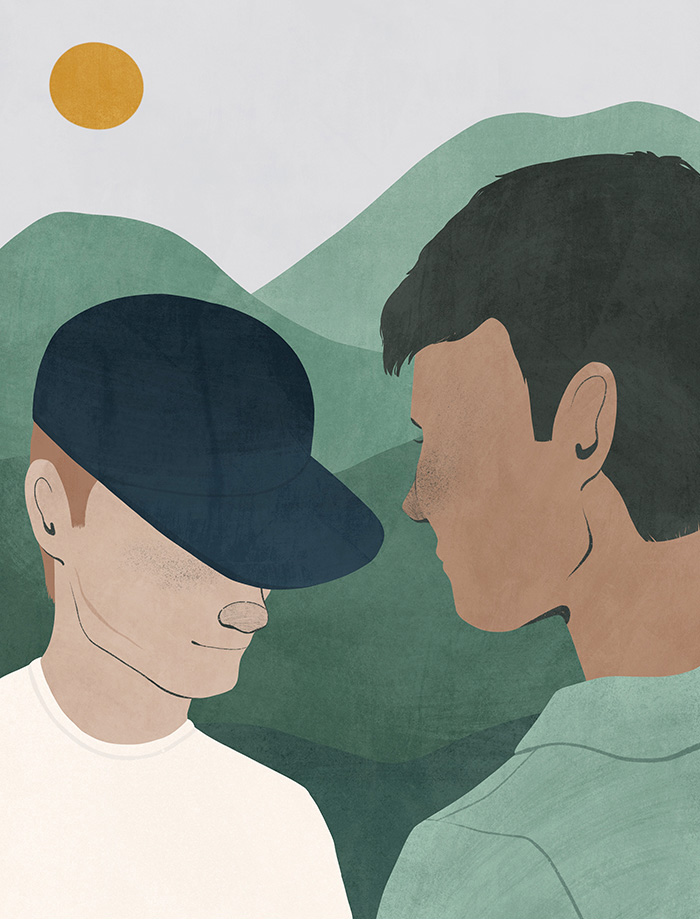
Portland Magazine
April 1, 2022
Story by Fr. Patrick Hannon, CSC
Illustration by Madeline Martinez

YEARS AGO I led a small group of students from Notre Dame High School for Boys outside of Chicago on a service learning trip to Ireland. We were joining Sister Mairead Hughes on an excursion she sponsored every summer for those teenagers from a tough and poor part of Dublin who had kept out of trouble for the most part, lovely rascals who could, for a couple weeks, hike green hills, kayak and swim along the inlet shores near Ferrycarrig, County Wexford, roast marshmallows, and snooze in sleeping bags in sweet night air. They all cussed, but I didn’t mind. Spoken in soft Dublin brogues, those crass words sounded lyrical. And they always apologized to Sister and me when we were within earshot. More than a few smoked. On the Feast of St. James, Sister gathered them together for Mass as a hen retrieves her wandering chicks. One of them, a girl of thirteen or fourteen, would have none of it. “Ah, but you know, don’t you, this is a feast of the Church,” Sister said solemnly. “And you are a Catholic, are you not?” “Ah, Sister Maireaaaaad,” the girl said. (Here I have her taking a drag from her cigarette.) “I am most certainly a Catholic. I just don’t believe in all that stuff.” I loved her audaciousness.
Another—I’ll call him Brendan—was the quietest of them all. You couldn’t help but notice the scar that ran from under his left earlobe to the edge of his chin. He was a small boy, thin and handsome, with a countenance that suggested he was always mulling over something important. In a quiet moment I asked Sister what had happened. Apparently his father had come home one night in an angry and drunken state and took a carpet cutter to the boy’s face. That explained—at least in that moment—why he was so soft-spoken. His wound, unlike most of ours, could not be hidden. Best to remain quiet. Best not to draw attention.
On a bus ride one day, Brendan spoke. “Can I have a look at your cap, Michael?” Michael—a young man of eighteen—was one of my students. He was sitting across from Brendan, next to me. Michael’s Notre Dame cap was his treasure. He began wearing it when he was a freshman, and by many accounts, never took it off except when he was inside school. Some said he wore it to bed. Well, Michael looked at me pleadingly, as though Brendan had asked for his left lung. (I am thinking now that Michael would rather have given Brendan his left lung.) I gave Michael no wiggle room, of course. So Michael took off his cap, reached across the aisle and carefully handed it to Brendan. Brendan inspected it for a moment, noticed the fine stitching, the attentive shaping of its curved bill. He ran his fingers over the entwined ND letters on its face. Then he put it on his head and turned back toward the window to watch the world as it passed by him. I’ll tell you this: that day, wherever Brendan went Michael went. At day’s end, Michael made Brendan surrender the hat. This went on for the next week. Brendan’s ask. Michael’s pleading. Michael’s surrender. Michael becoming Brendan’s shadow until sunset. Brendan’s surrender.
The last day: my ND kids are hugging the kids from Dublin. They exchange emails. A long goodbye. I’m in the van watching it all from the rearview mirror. I see Michael looking for Brendan who has his cap. Brendan’s nowhere to be found. Ah, I see him. He’s poking his head out from the edge of the dorm a hundred yards away. He’s wearing the cap. Michael at last sees him. He makes his way, slowly, to Brendan. They meet like two old friends. Heads hanging down. Hands in pockets. They are conversing. Brendan finally looks up. He takes off the cap and hands it to Michael. Michael places it on his head, centers it perfectly. They shake hands. Michael turns and begins walking to the van. I pray to God, I do. I say, You can’t let the story end this way. Please God. I’m not asking for a Hollywood ending. No violins. I want a Jesus ending. Michael stops. He looks up to the sky. On a stack of bibles I swear he did. Do I detect a sigh? He turns around and returns to Brendan. They talk some more. Michael takes off his cap—his love, his treasure, his reason for living—and places it gently, tenderly, on Brendan’s head. He adjusts the cap so it perfectly aligns with Brendan’s eyes and nose. They shake hands. Michael turns and makes his way to the van. He gets in and retreats to the far back and sits next to the window, where he looks out upon the world with a countenance that suggests he is mulling over something important. I do everything not to burst into tears.
I’m asked occasionally where I see God in this beautiful and broken world of ours. I begin by reciting a line from Patrick Kavanagh’s poem “The Great Hunger”: “God is in the bits and pieces of Everyday — / A kiss here and a laugh again, and sometimes tears, / A pearl necklace round the neck of poverty.” Then, if they have time, I’ll tell them a story like this one—about a scar that went from below an Irish boy’s left earlobe to the edge of his chin and about a Chicago boy and his baseball cap that became a healing gift, a sacrament of merciful, mending love.
FR. PATRICK HANNON, CSC, ’82 is an essayist. He teaches writing at University of Portland.
University of Portland
5000 N. Willamette Blvd.,
Portland, Oregon 97203-5798
503.943.8000
This website uses cookies to track information for analytics purposes. You can view the full University of Portland privacy policy for more information.
